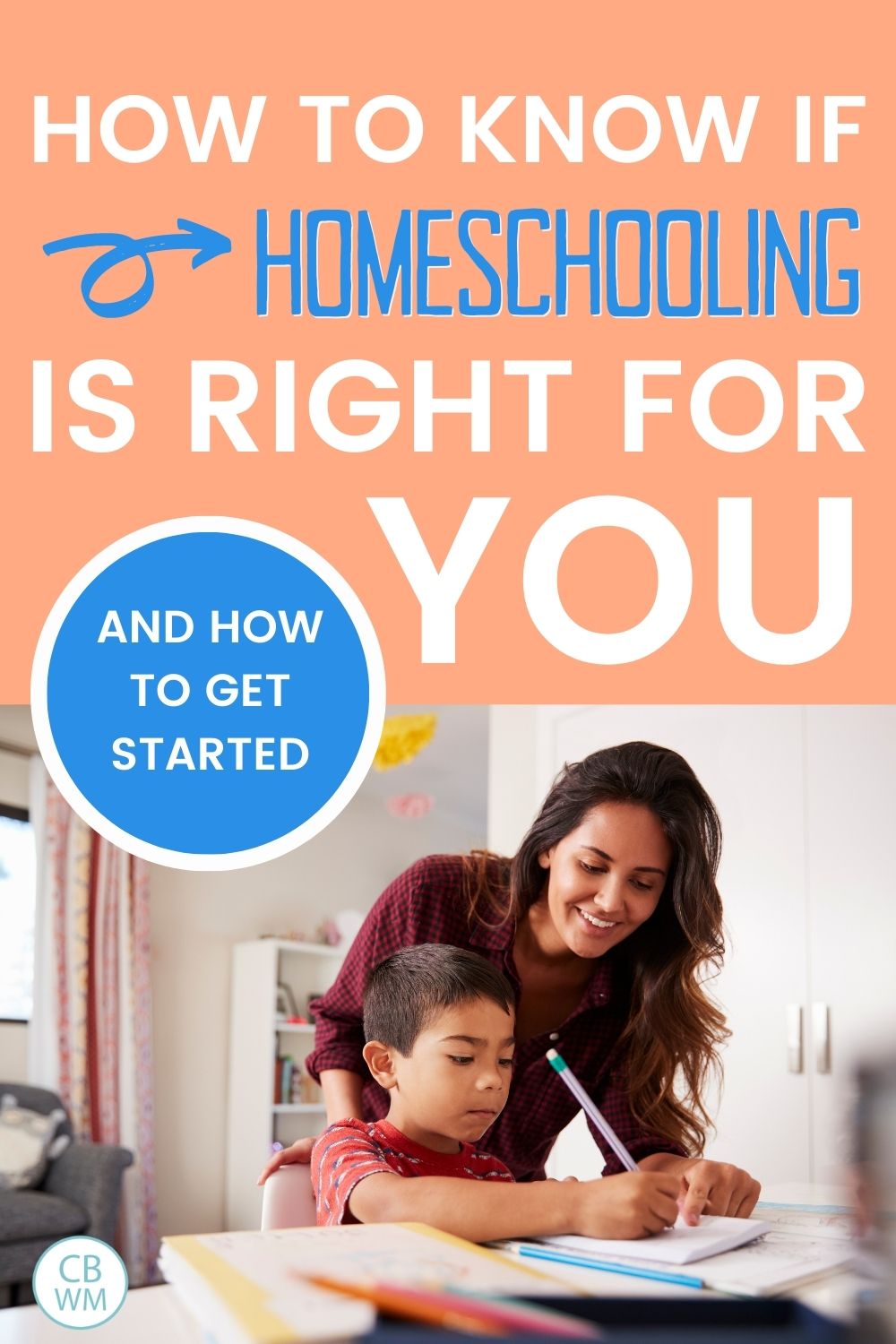There are many good reasons to homeschool and many good reasons to public school. Find out if homeschooling is right for you and how to get started.

Guest post
School closures during the pandemic forced many of us to act as teachers to our kids, whether that was supporting their online classes or switching over to a homeschool curriculum.
And while it was definitely an adjustment for many of us, one survey suggests that a lot of families aren’t planning to send their kids back to traditional school…ever.
US Census Bureau data shows that the number of homeschooling families doubled during the pandemic, and increased as much as fivefold among African American families.
Like all parenting paths, the decision to homeschool is a personal choice that comes with its unique benefits and challenges. With this kind of education becoming more commonplace, we wanted to look at why some families make the decision to homeschool, and what it takes to do this successfully.
Have you been considering homeschooling your children? There are a few things you should consider.
Post Contents
- Why Some Families Choose Homeschooling
- More Appropriate Education
- Fears About School Safety
- Family or Personal Needs
- Why Some Families Choose Traditional School
- Socialization
- Preparation for Life Outside the Home
- Educational Resources
- Is Homeschooling Right For You?
- How to Get Started with Homeschooling
- Know the Laws in Your Area
- Choose a Curriculum
- Becoming Your Child’s Teacher
- Connect with Homeschool Learners in Your Area
- You Are Your Child’s First and Best Teacher
Why Some Families Choose Homeschooling
Homeschooling parents are a surprisingly diverse group, and their reasons for educating at home are equally diverse. Here are the top three.
More Appropriate Education
Probably the number one reason families choose to homeschool is the perception that the public school system doesn’t serve their children’s needs.
Some homeschooling families feel that the public school system doesn’t teach the values that are important to them.
Others find the curriculum to be inadequate to their children’s educational needs. A school setting isn’t always the best option for children with special needs, for example. Likewise, children who need an accelerated curriculum can become bored and discouraged in an educational system that holds them back.
In either case, homeschooling allows students to learn at their own pace, rather than one prescribed by the school board.
Parents may also feel frustrated by a lack of school choice in their area.
While private schools are an option for some, their price can put them out of reach for others. And charter schools aren’t always available. So educating at home can be an attractive option.
Fears About School Safety
School shooter drills are a fixture in public schools. But instead of reassuring students of their safety, a study showed that the drills are correlated with a 42 percent increase in anxiety and a 39 percent increase in depression among school age children.
Whether parents want to keep their children safe from shootings, or from the mental health toll of constant drills, for some families, home education is a more reassuring option to keeping their children safe.
The pandemic and long-term online schooling also revealed problems and inequalities built within the traditional school system. Zoom classes, lack of resources, and limited curriculum brought parents face to face with some of the ways in which traditional schools are failing children of color, and families from underprivileged, underrepresented backgrounds. From differences in disciplining Black and Hispanic children to a curriculum that fails to center them, it was enough for some parents to re-think the learning their kids are exposed to.
And for some parents whose children have experienced bullying or ostracism, the option to homeschool offered relief for their kids. For kids who are often targets of bullies, home education may be a safer and happier option.
Family or Personal Needs
There have always been students whose family needs are impossible to reconcile with a school schedule.
Student athletes or performers, for example, may not be able to fit both school and practice into the confines of the school day.
Some homeschooled students aren’t resident in one place for the entire school year. In this case, remote learning makes more sense for maintaining the continuity of their education.
And there are some homeschooled children whose own medical needs make attending their local school difficult or impossible. Many school districts have longstanding homeschool programs for students with specific medical needs.
These are just a few reasons that the number of homeschoolers are increasing.
Why Some Families Choose Traditional School

At the same time, many parents place a lot of value on in-school education, and not just parents who work full time. Public education provides opportunities for children to meet people they might not otherwise encounter, and to build a shared experience of culture and knowledge.
There are other reasons, too. Here are a few of them.
Socialization
Education isn’t just about math and reading. Children need to socialize with other children. It’s one of the ways that we build a society based on shared cultural values and experiences. And it teaches children how to negotiate social relationships and solve interpersonal conflicts.
Many people also see public education as a democratizing force. In a public school setting, children interact with people who may or may not look like them or speak the same language at home. Their classmates may live similar lives, or their lives may be quite different. At the same time, all students are part of the school community.
Preparation for Life Outside the Home
The school environment also prepares children to become functioning members of a society. Children learn the subject area knowledge that they will need to operate in the adult world. They also learn to function as part of a group, rather than only as individuals.
Public education also teaches students about responsibility, scheduling, time management, and deadlines.
Educational Resources
We all like to think that we have what it takes to give our kids what they’ll need to thrive in the adult world. But the truth is, knowledge moves fast, and what many of us learned in fourth of fifth grade is now second grade material.
Moreover, what a lot of kids are learning in high school didn’t even exist when we were their age.
Many traditional schools have resources at their disposal that individual parents don’t. Whether it’s advanced computer equipment or teachers with specialized training, your local school can be a one-stop knowledge shop.
And let’s not forget extracurricular opportunities, like drama, art, and field trips!
Of course there are similar resources available for homeschooling families. But a good traditional school can make those resources easier and more convenient to access.
Is Homeschooling Right For You?
There’s no “right” way to educate your child, and ultimately how much traditional schooling vs. homeschooling you participate in depends on your family.
Also, it’s important to note that just because you start your child out in homeschool (or switch to it later) doesn’t mean you can’t always go back to traditional schooling at a later different. Some parents may choose to just do preschool or kindergarten at home. Meanwhile, other families may want to start their kids out in school to get the basics down, and then later have them homeschool in middle or high school if they need a more personalized curriculum.
It’s important, however, that you can provide an adequate substitute. This means a written curriculum that teaches the subject area knowledge that your children will need for further education or employment.
This also means that someone in your household must be able to deliver that knowledge reliably, accurately, and consistently. It’s not enough to sit your child in front of a computer and expect them to teach themselves.
Children also need to interact with others outside their family.
This doesn’t have to happen in a school setting. Many areas have homeschooling groups where homeschooled children can meet up and even learn together. You can also find classes through your Parks and Recreation department, religious and social organizations, museums, your local zoo, and more.
You don’t necessarily have to choose one system over the other. Some families mix and match, for example, homeschooling their children during the elementary years, then sending them to a traditional middle school or high school.
If you think homeschooling may be the best option for your family, make sure you have the right resources at your fingertips. Our resources guide below can help you get started.
To sum it up, homeschooling may be a good option for you if:
- You have access to a robust curriculum in math, science, reading, writing, history, and so forth
- Someone in your home is able to provide consistent, high quality instruction
- Your children have opportunities to socialize with other children
- Your homeschooling program meets the legal requirements of your state or school district
Most of all, it’s important that both you and your children believe that home education is the best way forward for your family.
How to Get Started with Homeschooling
Home education is what you make of it. Done right, it can provide your children with a great start toward a bright future. Here are a few things that can help.
Know the Laws in Your Area
Every state sets its own education laws. Many also have laws that apply to home schools. These laws may cover:
- Ages in which students must be in school
- Mandatory instructional hours
- Required skills and subjects
- Requirements for homeschool teachers
- Testing and assessment requirements
- Immunization requirements
- And more
The Homeschool Legal Defense Association has a database with the laws and regulations for each state. If you’re planning to educate your kids at home, make sure your program is on the right side of the laws of your state.
Choose a Curriculum
You don’t have to go it alone, and you don’t have to come up with all of your own lessons and materials.
There are a huge number of homeschool programs available to cover just about every subject area. You’ll also find curricula aimed at students with different educational needs and learning styles.
Choosing can be overwhelming.
Websites like TeacherVision have a wealth of information about different homeschool programs for different grade levels, subjects, and educational needs. You can also access free worksheets and printables, suggested reading lists, and more.
HomeschoolCurriculum.org is another excellent resource with a vibrant online community.
Becoming Your Child’s Teacher

You don’t have to be a certified teacher to be a great homeschool teacher. However, educators have learned a variety of techniques for getting subject material across to students, and making sure that the learning sticks.
Would you like to learn how to be a better teacher for your kids?
It’s easy: read.
Reading about child development will help you to understand what your kids are ready for at their age, and the types of educational activities that work best for different age groups.
You can also take classes aimed at teachers, child care workers, and teacher assistants. Your local community college can be a low-cost way to start.
Homeschool conventions are a good place to find workshops aimed specifically at home educators. And other parents from your local homeschool community can give you their own tips and tricks for making homeschooling work for your family.
Connect with Homeschool Learners in Your Area
Last, but not least, make sure to connect up with other homeschooling families. Not only does this provide opportunities for fun and learning, but it can also give your children, and you, that all-important social interaction that we all crave.
You Are Your Child’s First and Best Teacher
Whether your children attend a traditional school, or you educate them at home, you are your child’s most important teacher.
Do you homeschool? Do you have any tips or tricks for our readers? We’d love to hear them.
This post is written by Family Education

